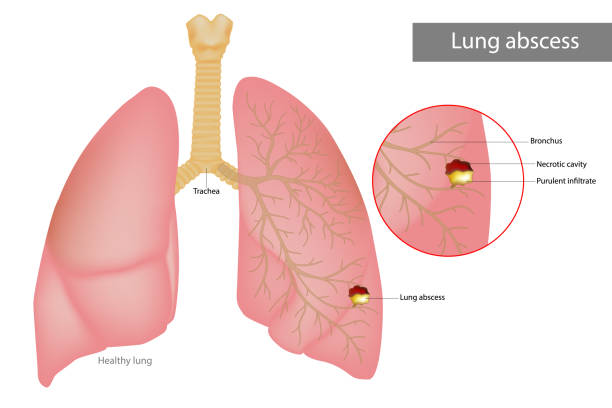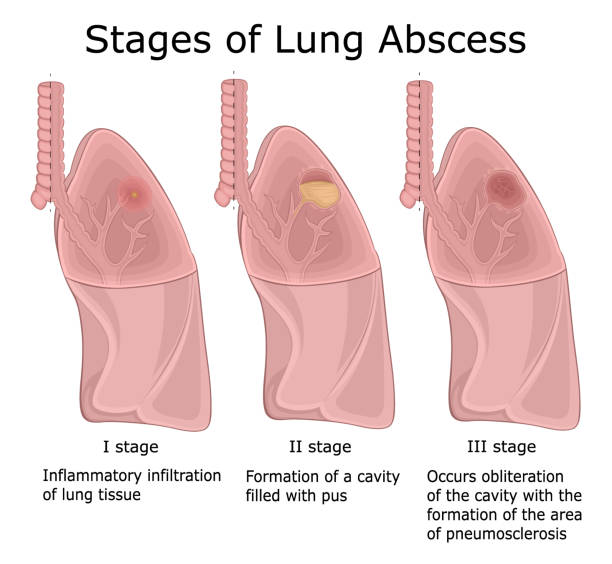Lung abscesses are a serious medical condition that can be life-threatening if left untreated. They occur when a pocket of pus forms within the lung tissue, leading to inflammation and infection. Symptoms of a lung abscess can include chest pain, a cough that produces foul-smelling or bloody sputum, fever, and chills. Causes of a lung abscess can vary from bacterial infections to aspiration of foreign objects or fluids. Treatment for a lung abscess typically involves antibiotics and draining the abscess, and in some cases, surgery may be necessary. Prevention is key to avoiding a lung abscess and can be done by getting vaccinated for certain infections, avoiding smoking, and maintaining good oral hygiene. It is important to know the signs and symptoms of a lung abscess so that it can be treated quickly and effectively.
What is a lung abscess?
A lung abscess is a pocket of pus that forms in the lung tissue. It is a serious infection that requires prompt treatment to reduce the risk of further complications, such as a lung infection (pneumonia), or even death. The pus pocket is caused by bacteria that travel from another part of the body and enter the lung through the blood. The abscess causes inflammation and swelling in the lung, which reduces the ability of the lung to take in oxygen and expel carbon dioxide. A lung abscess can also travel through the blood vessels to other parts of the body, such as the brain or the heart. A lung abscess can be caused by aspiration of bacteria from the mouth or lungs or by bacteria entering the blood, for example, from a urinary tract infection. A lung abscess can also occur in people with poor immune systems, such as people who have cancer or are receiving chemotherapy. A lung abscess occurs more often in people who smoke or who have certain types of COPD or cystic fibrosis.
Reference Source
Symptoms of a lung abscess
The main symptom of a lung abscess is a persistent cough, often producing foul-smelling or bloody sputum. Fever and chills are also common. Other symptoms include chest pain and shortness of breath. If a lung abscess travels to other parts of the body, such as the brain, symptoms may include nausea, vomiting, and confusion. If a lung abscess ruptures, it can cause septic shock, a serious condition that requires immediate medical attention. Symptoms of septic shock include a drop in blood pressure, rapid heart rate, dizziness, confusion, and drowsiness.
Reference Source
Causes of a lung abscess
The most common cause of lung abscess is aspiration of bacteria from the mouth or lungs. This may occur as a result of inhaling vomit or saliva, due to stroke, drug abuse, or eating or drinking while one is unconscious. Lung abscess can also be caused by bacteria entering the blood, for example, from a urinary tract infection. Lung abscesses are more common in people with poor immune systems, such as people who have cancer or are receiving chemotherapy. A lung abscess occurs more often in people who smoke or who have certain types of chronic obstructive pulmonary disease (COPD) or cystic fibrosis.
Treatment for a lung abscess
Treatment for a lung abscess typically involves antibiotics and draining the infection. If a lung abscess ruptures, emergency surgery may be required. In some cases, it may be necessary to remove a portion of the lung where the abscess is located. The prognosis for a lung abscess is dependent on its severity and the promptness of treatment. A lung abscess is life-threatening, so it is important to seek medical attention as soon as symptoms are noticed.
Surgery for a lung abscess
Surgery is often necessary to treat a lung abscess if there is no improvement after taking antibiotics for 2-3 weeks. A lung abscess may be treated with a procedure called needle aspiration, in which a doctor inserts a needle into the lung and aspirates (removes) the pus. In some cases, an incision may be made to drain the pus from the lung tissue. If a lung abscess is large and near the surface of the lung, it may be necessary to surgically remove a portion or the entire lung.
Prevention of a lung abscess
The best way to prevent a lung abscess is to avoid smoking and get vaccinated for certain infections. In general, people with chronic medical conditions should also avoid places with poor air quality. Smoking damages the lungs and increases the risk of a lung abscess. It is important to get vaccinated against certain infections that increase risk of a lung abscess, such as pneumococcal infection and influenza. It is also important to maintain good oral hygiene and avoid places with poor air quality.
People who are at high risk of developing a lung abscess may benefit from vaccinations against pneumococcal infections, influenza, and pertussis. These vaccines can help prevent bacterial infections that may lead to a lung abscess.
Smoking can cause lung infections that may lead to a lung abscess. It is important to quit smoking as soon as possible to reduce the risk of lung infections and lung cancer.

People with chronic medical conditions are at higher risk of developing a lung abscess. It is important to practice good oral hygiene to reduce the risk of developing an infection that may lead to a lung abscess. Brushing at least twice a day and flossing once a day can help prevent bacterial buildup in the mouth, which can travel to the lungs. A regular oral hygiene routine can also help prevent other complications associated with chronic medical conditions, such as diabetes and Parkinson’s disease.
Reference:
https://www.webmd.com/lung/lung-abscess-overview
https://www.sciencedirect.com/topics/nursing-and-health-professions/lung-abscess
https://www.healthline.com/health/lung-abscess
https://www.starhealth.in/blog/lung-abscess
https://en.m.wikipedia.org/wiki/Lung_abscess

So informative post, it is something serious and should be treated as soon as possible, greetings from Venezuela
Thanks for your contribution to the STEMsocial community. Feel free to join us on discord to get to know the rest of us!
Please consider delegating to the @stemsocial account (85% of the curation rewards are returned).
Thanks for including @stemsocial as a beneficiary, which gives you stronger support.
Very informative
!1UP
You have received a 1UP from @gwajnberg!
@stem-curator
And they will bring !PIZZA 🍕.
Learn more about our delegation service to earn daily rewards. Join the Cartel on Discord.